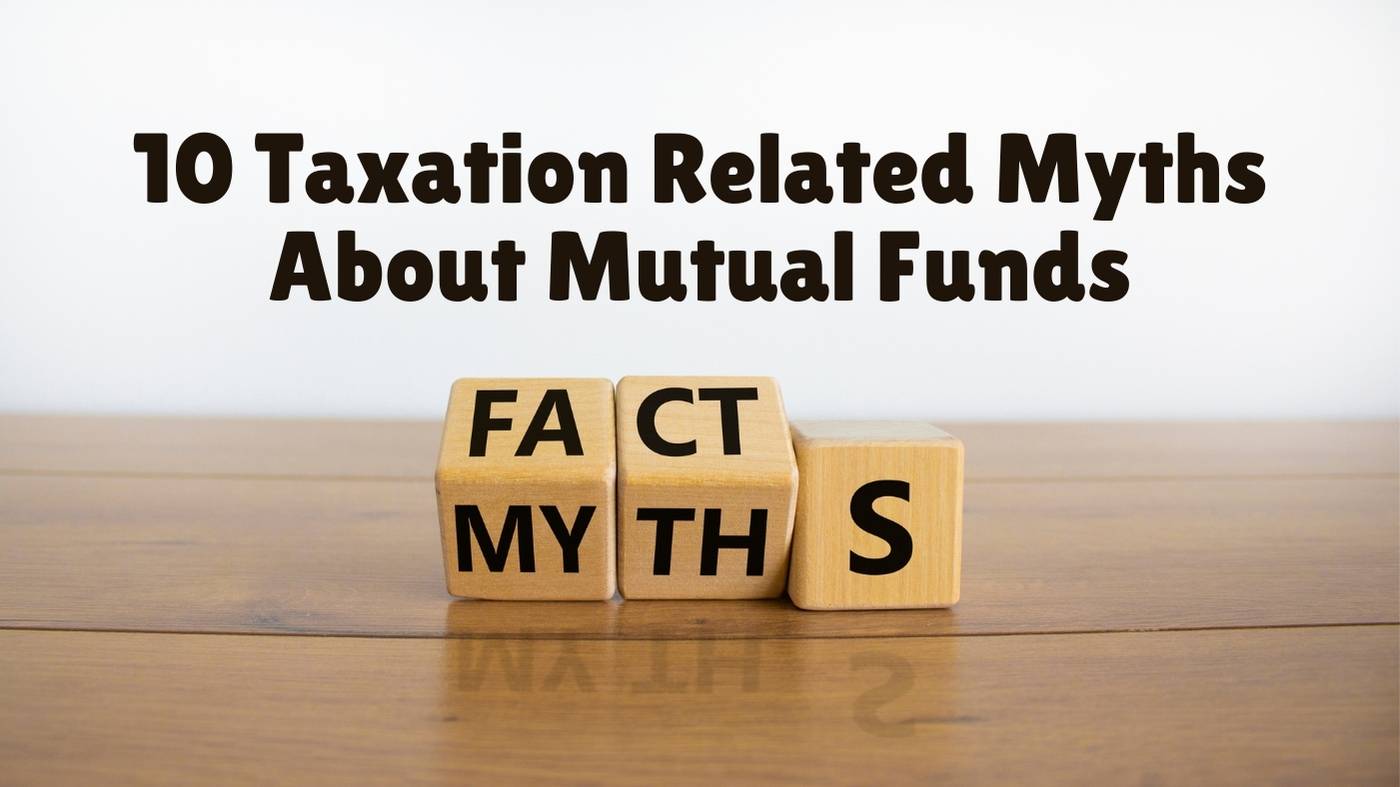Taxation is one of the most misunderstood aspects of mutual fund investing. Many investors fall prey to common myths, leading to incorrect financial decisions. In this blog, we will bust some of the most prevalent taxation myths related to mutual funds.
10 Taxation Related Myths About Mutual Funds
Myth 1: Mutual Fund Returns Are Tax-Free
Fact: The taxation of mutual fund gains varies according to the duration of your investment and the fund’s classification. Equity mutual funds held for over a year are taxed at 10% for gains above Rs. 1.25 lakh (increased from Rs. 1 lakh), while debt funds purchased after March 31, 2023, are taxed at slab rates, irrespective of the holding period.
Example: Long-term capital gains (LTCG) above Rs. 1 lakh per year from equity mutual funds attract a 10% tax.
Myth 2: Only Dividends from Mutual Funds Are Taxable
Fact: Both capital gains and dividends are subject to taxation. The Dividend Distribution Tax (DDT) was abolished in 2020, and now dividends are taxed as per the investor’s income tax slab.
Example: If you fall under the 30% tax bracket and receive Rs. 10,000 as a dividend, you must pay Rs. 3,000 in tax.
Myth 3: ELSS Is the Only Tax-Saving Mutual Fund
Fact: ELSS is a tax-saving mutual fund under Section 80C, but other funds offer tax benefits through long-term capital gains indexation. Debt mutual funds held for over three years enjoyed indexation, but this benefit was removed for purchases made after July 23, 2024.
Example: Debt mutual funds held for over three years benefit from indexation, reducing taxable gains.
Myth 4: Short-Term Capital Gains Tax Applies Only to Stocks, Not Mutual Funds
Fact: Short-term capital gains (STCG) tax also applies to mutual funds. STCG on equity funds (held for less than a year) is taxed at 15%, while for debt funds purchased after March 31, 2023, gains are now taxed according to the investor’s applicable income tax slab.
Example: STCG on equity funds (holding period <1 year) is taxed at 15%, while gains on debt funds are taxed as per your income tax bracket.
Myth 5: All Mutual Funds Have the Same Tax Treatment
Fact: Different types of mutual funds have different tax structures. Equity-oriented funds (investing at least 65% in equity) have favourable LTCG rates, while hybrid and debt funds are taxed differently based on their equity exposure.
Example: Equity funds held for over one year attract a 10% LTCG tax, while debt funds are taxed as per income tax slabs.
Myth 6: Liquid Mutual Funds Have No Tax Liability
Fact: Liquid funds are taxed like other debt mutual funds. Gains are added to your income and taxed at your income tax slab rate, regardless of the holding period for funds purchased after March 31, 2023.
Example: A 2-year investment in a liquid fund will be taxed per the investor’s income tax slab.
Myth 7: Long-Term Capital Gains Tax Is Not Applicable to Mutual Funds
Fact: LTCG tax applies to equity mutual funds at 10% (beyond Rs. 1.25 lakh) and to debt mutual funds at slab rates if purchased after March 31, 2023. Indexation benefits for long-term debt funds have been removed from July 23, 2024.
Example: If your LTCG from equity funds is Rs. 1.5 lakh, you must pay 10% on Rs. 25,000.
Myth 8: Switching Mutual Funds Does Not Attract Tax
Fact: Switching from one mutual fund scheme to another is considered a redemption subject to capital gains tax.
Example: Moving from one equity fund to another after 2 years will attract a 10% LTCG tax if gains exceed Rs. 1 lakh.
Myth 9: Investing in Mutual Funds Helps Avoid Tax Completely
Fact: Certain mutual funds have tax advantages, but investors should know they will still be taxed on capital gains and dividends.
Example: ELSS investments reduce taxable income under Section 80C, but withdrawals after 3 years are taxable under LTCG rules.
Myth 10: SIP Investments Are Fully Tax-Exempt
Fact: SIPs do not provide automatic tax exemption. Each SIP instalment is considered a new investment and is taxed based on the holding period at redemption.
Example: A 3-year SIP will have different tax treatments for each monthly instalment based on its holding duration.
Invest Smarter with VSJ FinMart
Understanding mutual fund taxation is crucial for maximising returns. If you need expert guidance on tax-efficient investment strategies, VSJ FinMart is here to help!
📩 Get in Touch with VSJ FinMart Today!
Invest with confidence and tax efficiency! 🚀
Final Thoughts
Many investors misunderstand the taxation of mutual funds, leading to costly mistakes. Depending on the type of mutual fund and how long you’ve held it, both dividend and capital gains income are subject to taxation. ELSS offers tax benefits, but not all mutual funds are tax-free. Also, switching funds and redeeming SIPs can attract taxes. Understanding these tax rules will help you plan better and maximise your returns. Always consider tax implications before investing to make informed financial decisions. Happy investing!
Explore our blogs to gain deeper insights into mutual fund investing:
- 10 General Myths About Mutual Funds
- 10 SIP-Related Myths About Mutual Funds
- 10 Performance-Related Myths About Mutual Funds
- 10 Risk-Related Myths About Mutual Funds
- 10 Investment Myths About Mutual Funds
- 10 Fund Management Myths About Mutual Funds
- 10 Redemption & Withdrawal Myths About Mutual Funds
Stay informed and invest wisely! 🚀
📢 Disclaimer
Mutual fund investments are subject to market risks, so read all scheme-related documents carefully before investing. Past performance is not indicative of future results. The information provided in this blog is for educational and informational purposes only and should not be considered investment advice. Investors should consult their financial advisors before making any investment decisions. VSJ FinMart is an AMFI-registered mutual fund distributor (MFD) that does not provide portfolio management or stock advisory services.

